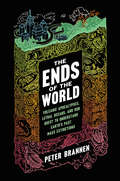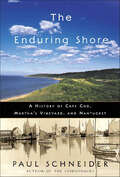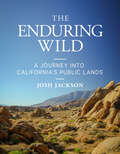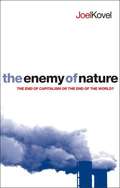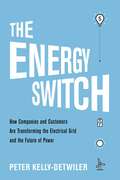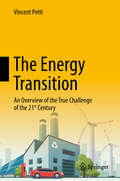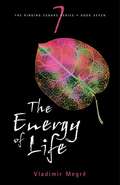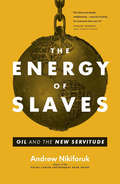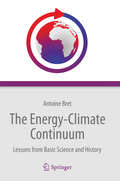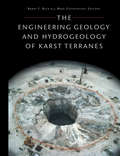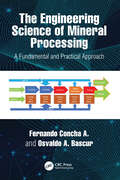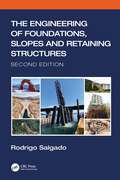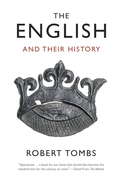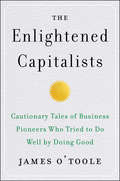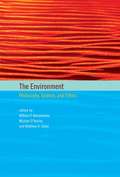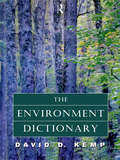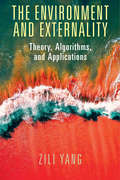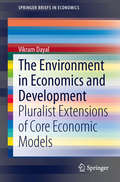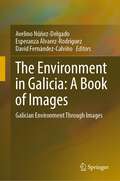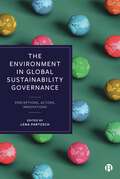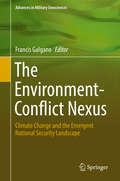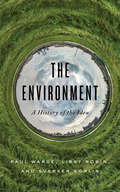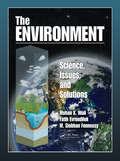- Table View
- List View
The Ends of the World: Volcanic Apocalypses, Lethal Oceans, and Our Quest to Understand Earth's Past Mass Extinctions
by Peter BrannenAs new groundbreaking research suggests that climate change played a major role in the most extreme catastrophes in the planet's history, award-winning science journalist Peter Brannen takes us on a wild ride through the planet's five mass extinctions and, in the process, offers us a glimpse of our increasingly dangerous future Our world has ended five times: it has been broiled, frozen, poison-gassed, smothered, and pelted by asteroids. In The Ends of the World, Peter Brannen dives into deep time, exploring Earth’s past dead ends, and in the process, offers us a glimpse of our possible future.Many scientists now believe that the climate shifts of the twenty-first century have analogs in these five extinctions. Using the visible clues these devastations have left behind in the fossil record, The Ends of the World takes us inside “scenes of the crime,” from South Africa to the New York Palisades, to tell the story of each extinction. Brannen examines the fossil record—which is rife with creatures like dragonflies the size of sea gulls and guillotine-mouthed fish—and introduces us to the researchers on the front lines who, using the forensic tools of modern science, are piecing together what really happened at the crime scenes of the Earth’s biggest whodunits.Part road trip, part history, and part cautionary tale, The Ends of the World takes us on a tour of the ways that our planet has clawed itself back from the grave, and casts our future in a completely new light.
The Enduring Shore: A History of Cape Cod, Martha's Vineyard, and Nantucket
by Paul SchneiderEven before the Pilgrims landed in 1620, Cape Cod and its islands promised paradise to visitors, both native and European. In Paul Schneider's sure hands, the story of this waterland created by glaciers and refined by storms and tides -- and of its varied inhabitants -- becomes an irresistible biography of a place.Cape Cod's Great Beach, Martha's Vineyard, and Nantucket are romantic stops on Schneider's roughly chronological human and natural history. His book is a lucid and compelling collage of seaside ecology, Indians and colonists, religion and revolution, shipwrecks and hurricanes, whalers and vengeful sperm whales, glorious clipper ships and today's beautiful but threatened beaches. Schneider's superb eye for story and detail illuminates both history and landscape. A wonderful introduction, it will also appeal to the millions of people who already have warm associations with these magical places.
The Enduring Wild: A Journey into California's Public Lands
by Josh JacksonA galvanizing road trip across California's immense public wilderness from a beloved adventurer."The Enduring Wild is a call to look beyond the surface, embrace the deep connections that tie us to our public lands, and commit to safeguarding them for future generations." —QT Luong, author of Treasured Lands: A Photographic Odyssey Through America's National ParksIt all began with a camping trip. Outdoor enthusiast Josh Jackson had never heard of "BLM land" before a casual recommendation from a friend led him to a free campsite in the desert—and the revelation that over 15 million acres of land in California are owned collectively by the people. In The Enduring Wild, he takes us on a road trip spanning thousands of miles, crisscrossing the Golden State to seek out every parcel of public wilderness therein belonging to the federal Bureau of Land Management, from the Pacific shores of the King Range down to the Mojave Desert. Over mountains, across prairies, and through sagebrush, Jackson unravels the stories of these lands. He tells of the Indigenous peoples who have called them home for millennia, of the extractivist threats that imperil them today, and of the grassroots organizers and political champions who have rallied to their common defense to uphold the radical mandate to protect these natural treasures for generations to come. For the adventurers, campers, explorers, map readers, road trippers, nature enthusiasts, and public lands lovers out there, The Enduring Wild is an indispensable invitation to know these places more deeply and to embrace our common inheritance. Illustrations by Rebekah Nolan.
The Enemy Of Nature: The End Of Capitalism Or The End Of The World?
by Joel KovelWe live in and from nature, but the way we have evolved of doing this is about to destroy us. Capitalism and its by-products - imperialism, war, neoliberal globalization, racism, poverty and the destruction of community - are all playing a part in the destruction of our ecosystem. <p><p> Only now are we beginning to realise the depth of the crisis and the kind of transformation which will have to occur to ensure our survival. This second, thoroughly updated, edition of The Enemy of Nature speaks to this new environmental awareness. Joel Kovel argues against claims that we can achieve a better environment through the current Western 'way of being'. By suggesting a radical new way forward, a new kind of 'ecosocialism', Joel Kovel offers real hope and vision for a more sustainable future.
The Energy Switch: How Companies and Customers Are Transforming the Electrical Grid and the Future of Power
by Peter Kelly-DetwilerThe energy industry is changing, and it&’s far more than just solar panels. Electric vehicles look to overtake gasoline-powered cars within our lifetimes, wind farms are popping up in unlikely places, traders are transforming energy into a commodity, and supercomputers are crunching vast amounts of data in nanoseconds while helping to keep our energy grids secure from hackers.The way humans produce, distribute and consume power will be cleaner, cheaper, and infinitely more complex within the next decade. In The Energy Switch, leading energy industry expert Peter Kelly-Detwilerlooks at all aspects of the transformation: how we got here, where we are going, and the implications for all of us in our daily lives. Kelly-Detwiler takes readers to the frontlines of the energy revolution. Meet Steve Collins, an executive from Commercial Development Corporation, the company that blew up two $570-million-dollar concrete cooling towers to create a staging ground for the new $70 billion U.S. offshore wind industry; Rob Threlkeld, a General Motors executive who convinced the auto giant to sign multiple 20-year renewable energy contracts worth hundreds of millions; Kevin McAlpin, a Texas homeowner who buys the power for his home on the electricity spot market – where prices can soar from less than one cent a kilowatthour to $9.00 over the course of a single day; Dr. Kristin Persson, who oversees a supercomputer that can process data at 30 quadrillion calculations per second, in the quest for better renewable energy and battery technologies; and John Davis, a Texas rancher who can keep his land intact, with help from the royalty payments from seven turbines spinning on his range.Energy creation and distribution has driven society&’s progress for centuries. Today, people are increasingly aware that it is imperative that humans move towards a cleaner, digitized, and democratized energy economy. The Energy Switch is about that multi-trillion dollar transformation, told from the perspective of those leading us to that bright future.
The Energy Transition
by Vincent PetitAgainst the backdrop of rapid advances in the energy sector, this book provides a concise overview of the complex challenges in the energy paradigm today, which revolve around the seemingly unsolvable energy equation. The author, an experienced energy professional, combines the various aspects of the energy transition into a single perspective. While highlighting a number of salient problems, he also explores grounds for optimism that these challenges can and will be met. After establishing the historical context, the book presents an analysis of today's energy industry, different energy sources, countries and determinants of energy demand, supplementing all sections with a wealth of global and local data. It subsequently proposes measures to solve the energy equation and a roadmap for a sustainable future, based on more efficient energy use, cleaner energy production and advanced technologies.
The Energy of Life (The Ringing Cedars Series #7)
by Vladimir Megré John Woodsworth Leonid SharashkinMan's life! On what or on whom does it depend? Why do some become emperors or regimental commanders, while others are obliged to fend for scraps at garbage dumps? One opinion holds that each person's fate is pre-determined from birth. That would make Man nothing more than an insignificant cog in some mechanised system, and not the highly organised creation of God.
The Energy of Slaves: Oil and the New Servitude
by Andrew Nikiforuk&“A robustly researched and smoothly written overview of the many challenges confronting our devotion to fossil fuels&” from the author of Tar Sands (Quill & Quire). Ancient civilizations relied on shackled human muscle. It took the energy of slaves to plant crops, clothe emperors, and build cities. Nineteenth-century slaveholders viewed critics as hostilely as oil companies and governments now regard environmentalists. Yet the abolition movement had an invisible ally: coal and oil. As the world&’s most versatile workers, fossil fuels replenished slavery&’s ranks with combustion engines and other labor-saving tools. Since then, cheap oil has transformed politics, economics, science, agriculture, and even our concept of happiness. Many North Americans today live as extravagantly as Caribbean plantation owners. We feel entitled to surplus energy and rationalize inequality, even barbarity, to get it. But endless growth is an illusion. In this provocative book, Andrew Nikiforuk, winner of the Rachel Carson Environment Book Award, argues that what we need is a radical emancipation movement that ends our master-and-slave approach to energy. We must learn to use energy on a moral, just, and truly human scale. Published in Partnership with the David Suzuki Institute &“In his cautionary tale about the evils of oil . . . Nikiforuk makes his case for impending doom if we don&’t mend our energy-spending ways.&” —The Star &“In this cogently argued book, Andrew Nikiforuk deploys a powerful metaphor. Oil dependency, he writes, is a modern form of slavery—and it&’s time for a global abolition movement.&” —Taras Grescoe, author of Shanghai Grand &“A startling critique that should rouse us from our pipe dream of endless plenty.&” —Ronald Wright, author of On Fiji Islands
The Energy-Climate Continuum
by Antoine BretThis book puts the debates about the energy-climate continuum on a scientific ground! It is a must-read for everyone, who wants to understand how intimately the energy and climate debates are linked to each other, and who wants to participate in these omnipresent discussions. Antoine Bret explains in his book how fossil fuels became indispensable for our society. He carefully explains how and why this impacts the earth's climate. And he points out that all available fossil fuels will sooner or later be used up. Therefore, he introduces and discusses the alternatives, which are currently considered. The book is divided into three parts. The first part explains the problem and where we stand today, the second part critically discusses possible elements of solution. The third part illustrates historic case studies, containing both warning as well as encouraging examples of societies at turning points. This book is a careful introduction to these topics. The basic science behind the problem and the debates are introduced in an understandable and nicely readable fashion. Facts are illustrated with simple back-on-the-envelope calculations, providing a good feeling for orders of magnitudes. A rich appendix provides additional background information for the interested readers. In this way, the book can even be a valuable resource for introductory university courses in physics, climate science, natural science and many more subjects. This book is a real conversation starter and can be recommended to everyone, specialist or non-specialist, who wants to understand the actual energy-climate debates and maybe even involve.
The Engineering Geology and Hydrology of Karst Terrains
by Barry F. BeckEngineers from around the world recount in this volume their successes and failures in attempting to deal with unique and quixotic landscapes.
The Engineering Science of Mineral Processing: A Fundamental and Practical Approach
by Osvaldo A. Bascur Fernando Concha AThe Engineering Science of Mineral Processing: A Fundamental and Practical Approach emphasizes the fundamentals of mineral processing to provide readers with a deep understanding of the science and phenomena that occur during the processing of ores. It also offers guidance on contemporary process implementation through practical industry applications. It includes examples of dynamic simulations and practical execution of advanced software to guide operating plans to ensure optimal conditions that predict process constraints. Focuses on the science of mineral processing, including particulate systems, hydrodynamics, and physical chemistry Discusses modeling, rheology, comminution, classification, flotation, and solid-liquid separation Includes practical examples from real-world industrial applications Provides information on dynamic process simulations and the application of digital twins in mineral processing plants to improve management and efficiency Details the future of mineral processing in the digital era. Offering a balance between fundamentals and applications, this book will be of interest to researchers and industry professionals working to optimize mining, mineral and chemical processing plants. It will also be of value to advanced students taking mineral processing and chemical engineering courses.
The Engineering of Foundations, Slopes and Retaining Structures
by Rodrigo SalgadoThe Engineering of Foundations, Slopes and Retaining Structures rigorously covers the construction, analysis, and design of shallow and deep foundations, as well as retaining structures and slopes. It includes complete coverage of soil mechanics and site investigations. This new edition is a well-designed balance of theory and practice, emphasizing conceptual understanding and design applications. It contains illustrations, applications, and hands-on examples that continue across chapters. Soil mechanics is examined with full explanation of drained versus undrained loading, friction and dilatancy as sources of shear strength, phase transformation, development of peak effective stress ratios, and critical-state and residual shear strength. The design and execution of site investigations is evaluated with complete discussion of the CPT and SPT. Additional topics include the construction, settlement and bearing capacity of shallow foundations, as well as the installation, ultimate resistance and settlement of deep foundations. Both traditional knowledge and methods and approaches based on recent progress are available. Analysis and design of retaining structures and slopes, such as the use of slope stability software stability calculations, is included. The book is ideal for advanced undergraduate students, graduate students and practicing engineers and researchers.
The English and Their History
by Robert TombsRobert Tombs's momentous The English and Their History is both a startlingly fresh and a uniquely inclusive account of the people who have a claim to be the oldest nation in the world. The English first came into existence as an idea, before they had a common ruler and before the country they lived in even had a name. They have lasted as a recognizable entity ever since, and their defining national institutions can be traced back to the earliest years of their history.The English have come a long way from those first precarious days of invasion and conquest, with many spectacular changes of fortune. Their political, economic and cultural contacts have left traces for good and ill across the world. This book describes their history and its meanings from their beginnings in the monasteries of Northumbria and the wetlands of Wessex to the cosmopolitan energy of today's England. Robert Tombs draws out important threads running through the story, including participatory government, language, law, religion, the land and the sea, and ever-changing relations with other peoples. Not the least of these connections are the ways the English have understood their own history, have argued about it, forgotten it and yet been shaped by it. These diverse and sometimes conflicting understandings are an inherent part of their identity.Rather to their surprise, as ties within the United Kingdom loosen, the English are suddenly embarking on a new chapter. The English and Their History, the first single-volume work on this scale for more than half a century, and which incorporates a wealth of recent scholarship, presents a challenging modern account of this immense and continuing story, bringing out the strength and resilience of English government, the deep patterns of division and also the persistent capacity to come together in the face of danger.From the Hardcover edition.
The English and Their History
by Robert TombsA New York Times 2016 Notable BookRobert Tombs's momentous The English and Their History is both a startlingly fresh and a uniquely inclusive account of the people who have a claim to be the oldest nation in the world. The English first came into existence as an idea, before they had a common ruler and before the country they lived in even had a name. They have lasted as a recognizable entity ever since, and their defining national institutions can be traced back to the earliest years of their history.The English have come a long way from those first precarious days of invasion and conquest, with many spectacular changes of fortune. Their political, economic and cultural contacts have left traces for good and ill across the world. This book describes their history and its meanings from their beginnings in the monasteries of Northumbria and the wetlands of Wessex to the cosmopolitan energy of today's England. Robert Tombs draws out important threads running through the story, including participatory government, language, law, religion, the land and the sea, and ever-changing relations with other peoples. Not the least of these connections are the ways the English have understood their own history, have argued about it, forgotten it and yet been shaped by it. These diverse and sometimes conflicting understandings are an inherent part of their identity.Rather to their surprise, as ties within the United Kingdom loosen, the English are suddenly embarking on a new chapter. The English and Their History, the first single-volume work on this scale for more than half a century, and which incorporates a wealth of recent scholarship, presents a challenging modern account of this immense and continuing story, bringing out the strength and resilience of English government, the deep patterns of division and also the persistent capacity to come together in the face of danger.
The Enlightened Capitalists: Cautionary Tales of Business Pioneers Who Tried to Do Well by Doing Good
by James O'TooleAn expert on ethical leadership analyzes the complicated history of business people who tried to marry the pursuit of profits with virtuous organizational practices—from British industrialist Robert Owen to American retailer John Cash Penney and jeans maker Levi Strauss to such modern-day entrepreneurs Anita Roddick and Tom Chappell. <P><P>Today’s business leaders are increasingly pressured by citizens, consumers, and government officials to address urgent social and environmental issues. Although some corporate executives remain deaf to such calls, over the last two centuries, a handful of business leaders in America and Britain have attempted to create business organizations that were both profitable and socially responsible. In The Enlightened Capitalists, James O’Toole tells the largely forgotten stories of men and women who adopted forward-thinking business practices designed to serve the needs of their employees, customers, communities, and the natural environment. They wanted to prove that executives didn’t have to make trade-offs between profit and virtue. <P><P>Combining a wealth of research and vivid storytelling, O’Toole brings life to historical figures like William Lever, the inventor of bar soap who created the most profitable company in Britain and used his money to greatly improve the lives of his workers and their families. Eventually, he lost control of the company to creditors who promptly terminated the enlightened practices he had initiated—the fate of many idealistic capitalists. <P><P>As a new generation attempts to address social problems through enlightened organizational leadership, O’Toole explores a major question being posed today in Britain and America: Are virtuous corporate practices compatible with shareholder capitalism?
The Environment
by Michael O'Rourke William P. Kabasenche Matthew H. SlaterPhilosophical reflections on the environment began with early philosophers' invocation of a cosmology that mixed natural and supernatural phenomena. Today, the central philosophical problem posed by the environment involves not what it can teach us about ourselves and our place in the cosmic order but rather how we can understand its workings in order to make better decisions about our own conduct regarding it. The resulting inquiry spans different areas of contemporary philosophy, many of which are represented by the fifteen original essays in this volume. The contributors first consider conceptual problems generated by rapid advances in biology and ecology, examining such topics as ecological communities, adaptation, and scientific consensus. The contributors then turn to epistemic and axiological issues, first considering philosophical aspects of environmental decision making and then assessing particular environmental policies (largely relating to climate change), including reparations, remediation, and nuclear power, from a normative perspective.
The Environment Dictionary
by David KempThe Environment Dictionary provides an essential source of information on all aspects of the environment. It includes all the basic scientific terms and concepts along with socio-economic, cultural, historical and political elements which impact on the environment. This dictionary provides the interdisciplinary approach required to understand environmental issues worldwide. Designed for a wide range of readers, the dictionary is up-to-date, easy to read and to reference and clearly and attractively presented. Selected environmental issues which have particular importance are treated in greater depth through a series of boxed case studies. A wide range of maps, diagrams, figures and photos illustrate the texts and extensie cross-referencing between entries ensures readers can build on their knowledge. References and further reading sections are drawn from a wide range of accessible sources - from newspaper articles and popular magazines to academic texts and journals and provide easy access to further study and development of readers' specific interests.
The Environment and Externality: Theory, Algorithms and Applications
by Zili YangThis innovative book models pollution mitigation as a negative externality whilst also providing desirable and useful solutions, such as establishing the triangular equivalence relationship among the Lindahl equilibrium without transfers, the Nash bargaining solution with the payoffs of the Cournot-Nash equilibrium as the status quo point, and the social optimum under the Lindahl weights. By introducing programming algorithms to validate these relationships numerically, Zili Yang bridges the gap between analytical results and empirical modelling, ultimately solving the Lindahl equilibrium and hybrid Nash equilibria in the influential RICE model. This text demonstrates the complexity and variety of environment externality problems, ranging from mixed externality to correlated externalities to environmental externality under IRS and policy applications. Integrating theory, algorithms and applications in a comprehensive framework, The Environment and Externality will benefit scholars and students working across environmental, resource and climate change economics.
The Environment and International Relations (Themes in International Relations)
by Kate O’NeillThe new edition of this exciting textbook introduces students to the ways in which the theories and tools of international relations and other social science disciplines can be used to analyse and address global environmental problems. Kate O'Neill develops an innovative historical and analytical framework for understanding global environmental issues, integrating insights from different disciplines, and she identifies the main actors and their roles, thereby encouraging readers to engage with the issues and equip themselves with the knowledge they need to apply their own critical insights. Revised and updated, the new edition features new figures, examples, textboxes, and a new chapter on the emergence and politics of market mechanisms as a new mode of global environmental governance. The latest developments in the field, including the December 2015 Paris Climate Agreement, along with new perspectives and recent thinking, are incorporated throughout. This will be invaluable for students of environmental issues both from political science and environmental studies perspectives. Builds an innovative analytical framework, enabling students to apply their own critical understanding of environmental issues using tools of international relations. All chapters have been thoroughly revised and updated to reflect the latest developments in the field, incorporating new perspectives and recent thinking, including the December 2015 Paris Climate Agreement. Incorporates new examples, textboxes, and figures throughout to explain key concepts and debates, enabling students to connect theory with practice.
The Environment in Economics and Development
by Vikram DayalThis brief views the environment through diverse lenses - those of standard economics, institutional economics, political science, environmental science and ecology. Chapter 2 discusses diverse theoretical and statistical models - constrained optimization models, game theory, differential equations, and statistical models for causal inference - in a simple manner. Developing countries have certain distinct environmental problems - traditional pollution and traditional dependence on the commons. While chapters 3 and 4 discuss these specific problems, statistical graphs of the World Development Indicators explore the macro-context of developing countries in chapter 1. Chapter 5 examines ecological systems, which are nonlinear and unpredictable, and subject to sudden regime shifts. Chapter 6 deals with the global challenges of climate change and biological invasions. The last chapter discusses sustainable development and institutions. The brief explains these topics simply; mathematics is largely confined to an appendix. The broad treatment and simple exposition will appeal to students new to the field of economics. The extension of core economic models in diverse directions will also be of interest to economists looking for a different treatment of the subject.
The Environment in Galicia: Galician Environment Through Images
by Avelino Núñez-Delgado Esperanza Álvarez-Rodríguez David Fernández-CalviñoThis book describes the environment in Galicia (NW Spain), with researchers and professors presenting their own photographs of relevant aspects. This richly illustrated book explains atmospheric, geologic, water, soils, landscapes, and environmental issues and treatments for a broad audience, including students and the general public, to raise awareness and effectively develop strategies to meet the Sustainable Development Goals.
The Environment in Global Sustainability Governance: Perceptions, Actors, Innovations
by Lena PartzschAvailable Open Access digitally under CC-BY-NC-ND licence. With Agenda 2030, the UN adopted wide-ranging Sustainable Development Goals (SDGs) that integrate development and environmental agendas. This book focuses on the political tensions between the environmental objectives and socio-economic aspects of sustainable development. The collection provides an introduction to interlinkages, synergies and trade-offs between the ‘green’ and other goals, such as gender equality and economic growth. It also considers related goals on cities and partnerships as crucial for implementing environmentally sound sustainability. Identifying governance failures and responsibilities, it advocates for a shift towards cooperative economics and politics for the common good.
The Environment-Conflict Nexus: Climate Change and the Emergent National Security Landscape (Advances in Military Geosciences)
by Francis GalganoThe aim of this book is to demonstrate how environmental factors have caused an evolution in the landscape of national security since the end of the Cold War. Through relevant case studies, the scope of the problem on the national security landscape due to environmental stressors is illuminated, examined, and synthesized with climate-related data. Human variables such as governance, GDP, and vulnerability are taken into account, and are compared against environmental factors to more accurately determine the causative agents of regional conflicts which threaten national security. These case studies comprise the majority of the text, and they show how individual conflicts are uniquely influenced by environmental stress with variations from situation to situation. This book will be of interest to government and military professionals, and may serve as a resource for college courses in the areas of military geography, international affairs, and sustainability studies.
The Environment: A History of the Idea
by Paul Warde Libby Robin Sverker SörlinAn in-depth look at the history of the environment.Is it possible for the economy to grow without the environment being destroyed? Will our lifestyles impoverish the planet for our children and grandchildren? Is the world sick? Can it be healed? Less than a lifetime ago, these questions would have made no sense. This was not because our ancestors had no impact on nature—nor because they were unaware of the serious damage they had done. What people lacked was an idea: a way of imagining the web of interconnection and consequence of which the natural world is made. Without this notion, we didn't have a way to describe the scale and scope of human impact upon nature. This idea was "the environment." In this fascinating book, Paul Warde, Libby Robin, and Sverker Sörlin trace the emergence of the concept of the environment following World War II, a period characterized by both hope for a new global order and fear of humans' capacity for almost limitless destruction. It was at this moment that a new idea and a new narrative about the planet-wide impact of people's behavior emerged, closely allied to anxieties for the future. Now we had a vocabulary for talking about how we were changing nature: resource exhaustion and energy, biodiversity, pollution, and—eventually—climate change.With the rise of "the environment," the authors argue, came new expertise, making certain kinds of knowledge crucial to understanding the future of our planet. The untold history of how people came to conceive, to manage, and to dispute environmental crisis, The Environment is essential reading for anyone who wants to help protect the environment from the numerous threats it faces today.
The Environment: Science, Issues, and Solutions
by Mohan K. Wali M. Siobhan Fennessy Fatih EvrendilekStrongly grounded in the scientific method and evidence, The Environment: Science, Issues, and Solutions presents an organized, accessible, building block approach that introduces the principles of ecology. This book examines the effects of technology use and the unprecedented economic growth and development that has tipped the natural balance of the environment, resulting in serious local, regional, and global environmental problems. This comprehensive text explores the need for interrelated long-term solutions for the prevention and mitigation of environmental problems.
